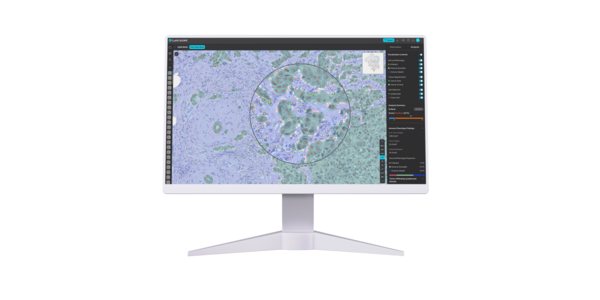Lunit said the results of a study using Lunit Scope IO, its AI biomarker, to predict treatment responses in bile duct cancer patients have been published in Clinical Cancer Research, a journal of the American Association for Cancer Research (AACR).

Recent studies have suggested that combining chemotherapy with immunotherapy could improve treatment outcomes in patients with advanced bile duct cancer, a disease known for its poor prognosis.
However, until now, there has been a lack of biomarkers to predict the effectiveness of such combination therapies.
As a result, a research team, led by Professors Yoo Chang-hoon of the Department of Oncology and Shin Jin-ho of the Department of Pathology at Asan Medical Center, and Lee Choong-kun of the Department of Internal Medicine at Yonsei Cancer Center, assessed the distribution of tumor-infiltrating lymphocytes (TILs) in 339 patients with advanced or metastatic bile duct cancer using Lunit Scope IO.
These patients received immunotherapy as a second-line treatment after initial chemotherapy.
They categorized the immune phenotypes (IP) into three groups -- immune-inflamed, immune-desert, and immune-excluded. The study aimed to validate the potential of AI-driven tumor microenvironment (TME) analysis as a useful biomarker for predicting the effectiveness of combination therapies in bile duct cancer.
The analysis revealed that patients classified as immune-inflamed by Lunit Scope IO showed significantly improved treatment outcomes compared to those in other groups.
Notably, the immune-inflamed group demonstrated a notably higher objective response rate (ORR) of 27.5 percent compared to 7.7 percent in the non-immune-inflamed groups. Additionally, this group had a longer overall survival (OS) of 12.6 months compared to 5.1 months, and a prolonged progression-free survival (PFS) of 4.5 months compared to 1.9 months.
"Bile duct cancer is one of the top nine most prevalent cancers in Korea,” Professor Yoo said. “Although immunotherapy has recently been introduced, its high cost has been a concern due to the limited efficacy in many patients.”
The ability to predict the effectiveness of expensive treatments using Lunit Scope could greatly alleviate concerns for both healthcare providers and patients, Yoo added.
Lunit CEO Suh Beom-seok also said, "This study holds significant clinical importance as it presents an effective biomarker for a cancer type with a challenging prognosis.”
With the results being published in a globally recognized journal, the company plans to continue validating the efficacy of AI-based biomarkers in other cancer types as well, Suh added.
Related articles
- Lunit and Volpara to provide AI solutions to large US imaging platform
- Lunit's subsidiary Volpara signs software supply agreement with top US healthcare system
- Lunit selected for Public Procurement Service’s 2024 innovative product trial purchase program
- Lunit's AI chest X-ray tool beats global competitors in detecting tuberculosis
- Lunit integrates AI solution into Roche Diagnostics' digital pathology platform
- Lunit to present AI-driven cancer treatment study at SITC 2024, selected for rapid oral presentation
- Lunit AI predicts breast cancer risk up to 6 years ahead
- [SITC 2024] MD Anderson study shows Lunit SCOPE IO platform could transform immunotherapy selection

